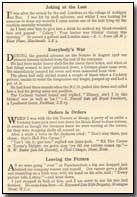Memoirs & Diaries - The Best 500 Cockney War Stories - Joking at the Last and Other Stories
 Published in London
in 1921, The Best 500 Cockney War Stories
comprised, in the words of its newspaper publisher (The London Evening
News) "a remembering and retelling of those war days when laughter
sometimes saved men's reason".
Published in London
in 1921, The Best 500 Cockney War Stories
comprised, in the words of its newspaper publisher (The London Evening
News) "a remembering and retelling of those war days when laughter
sometimes saved men's reason".
The collection of short memoirs, some 500 in total, is divided into five categories - Action, Lull, Hospital, High Seas and Here and There. This page contains five stories from Action, led by Joking at the Last.
Other sections within the collection can be accessed using the sidebar to the right.
Joking at the Last
It was after the attack by the 2nd Londons on the village of Aubigny au Bac. I was hit by shell splinters, and whilst I was looking for someone to dress my wounds I came across one of the lads lying by the roadside mortally wounded.
As I bent over him to give him a drink he noticed my blood-streaked face and gasped: "Crikey! Your barber was blinkin' clumsy this morning."
So passed a gallant 2nd London man.
E.C. Easts (M.M.), Eliot Place, Blackheath, S.E.3
Everybody's War
During the general advance on the Somme in August 1918 our platoon became isolated from the rest of the company. We had been under heavy shell-fire for about three hours, and when at last things seemed to have quietened down, a German plane came over. We immediately jumped for cover and were concealed from view.
The plane had only circled round a couple of times when a Cockney private, unable to resist the temptation any longer, jumped up and had a pot at it.
He had fired three rounds when the N.C.O. pulled him down and called him a fool for giving away our position.
The Cockney turned round and replied, "Blimey, ain't I in this blinkin' war as well as 'im?"
E. Purcell (late 9th Royal Fusiliers), 4 Lyndhurst Grove, Peckham, S.E.15
Orders is Orders
When I was with the 6th Dorsets at Hooge, a party of us under a Cockney lance-jack were sent down the Menin Road to draw rations.
It seemed as though the Germans knew we were waiting at the corner, for they were dropping shells all around us.
After a while a voice in the darkness cried: "Don't stay there, you chaps; that's Hell Fire Corner!"
"Can't 'elp it, guv'nor," replied our lance-jack. "'Ell Fire Corner or 'Eaven's Delight, we gotta stop 'ere till our rations comes up."
H.W. Butler (late 6th Dorsets), 2 Flint Cottages, Stone, Kent
Leaving the Picture
As we were going "over" at Passchendaele a big one dropped just behind our company runner and myself. Our runner gave a shout and stumbling on a little way, with his hand on his side, said: "Every picture tells a story" - and went down.
I just stopped to look at him, and I am sorry to say his war had finished. He came from Bow.
G. Hayward (late Rifle Brigade), Montague Street, W.C.1
Ginger's Gun Stopped
I was in a Lewis gun section, and our sergeant got on our nerves while we were learning the gun by always drumming in our ears about the different stoppages of the gun when in action. My mate, Ginger Bryant, who lived at Stepney, could never remember the stops, and our sergeant was always rousing poor old Ginger.
Well, we found ourselves one day in the front line and Jerry had started an attack. Ginger was No. 1 on the gun and I was lying beside him as No. 2. We were giving Jerry beans with our gun when a bomb hit it direct and blew Ginger and myself yards away.
Ginger had his hand blown off, but crawled back to the gun, which was smashed to pieces. He gave one look at it and shouted to me: "Nah go and ask that blinkin' sergeant what number stoppage he calls this one!"
Next thing he fainted.
Edward Newson (late 1st West Surrey), 61 Moneyer Street, Hoxton, N.1
Next - A Careless Fellow and four other stories
A "creeping barrage" is an artillery bombardment in which a 'curtain' of artillery fire moves toward the enemy ahead of the advancing troops and at the same speed as the troops.
- Did you know?
